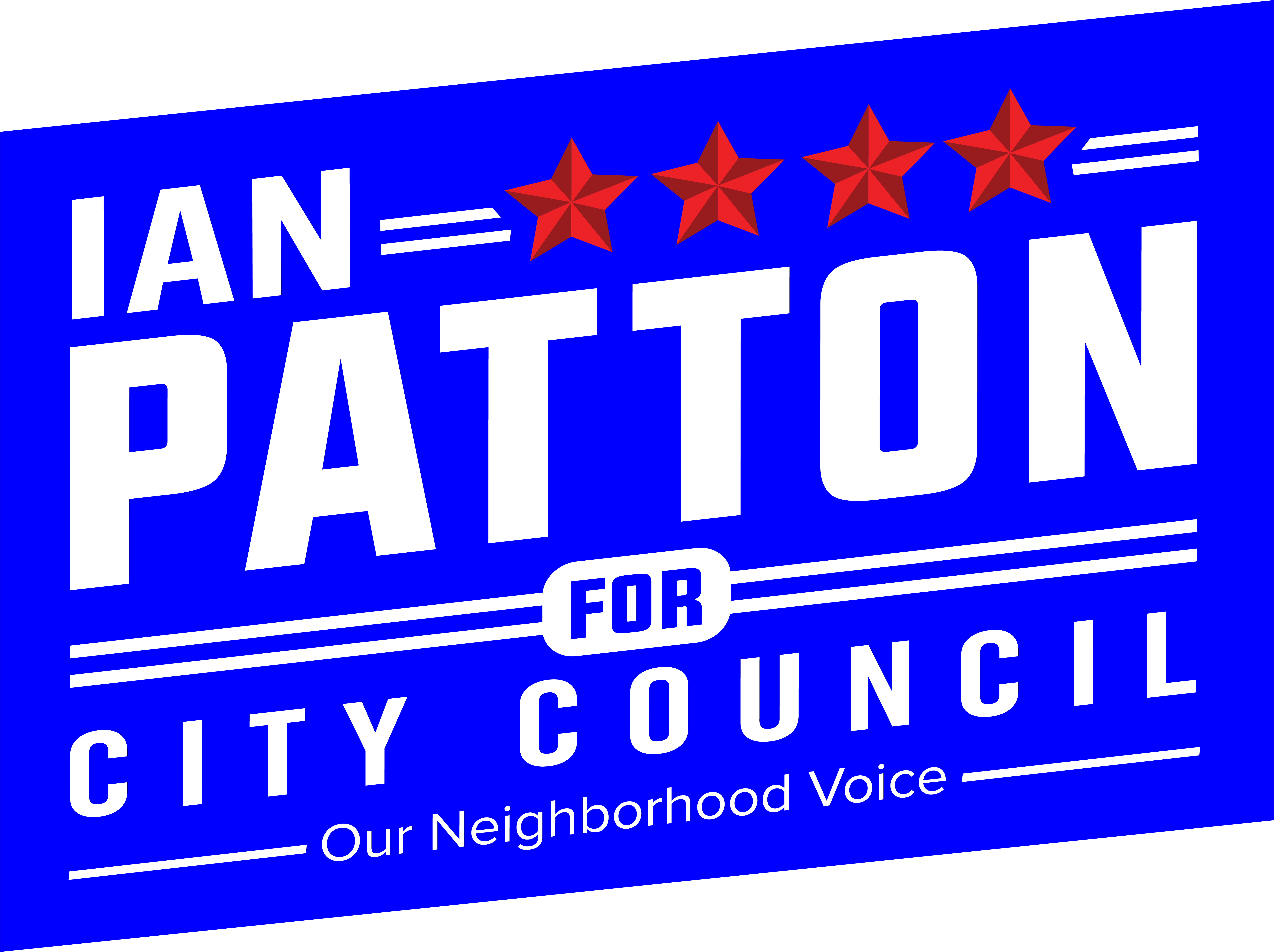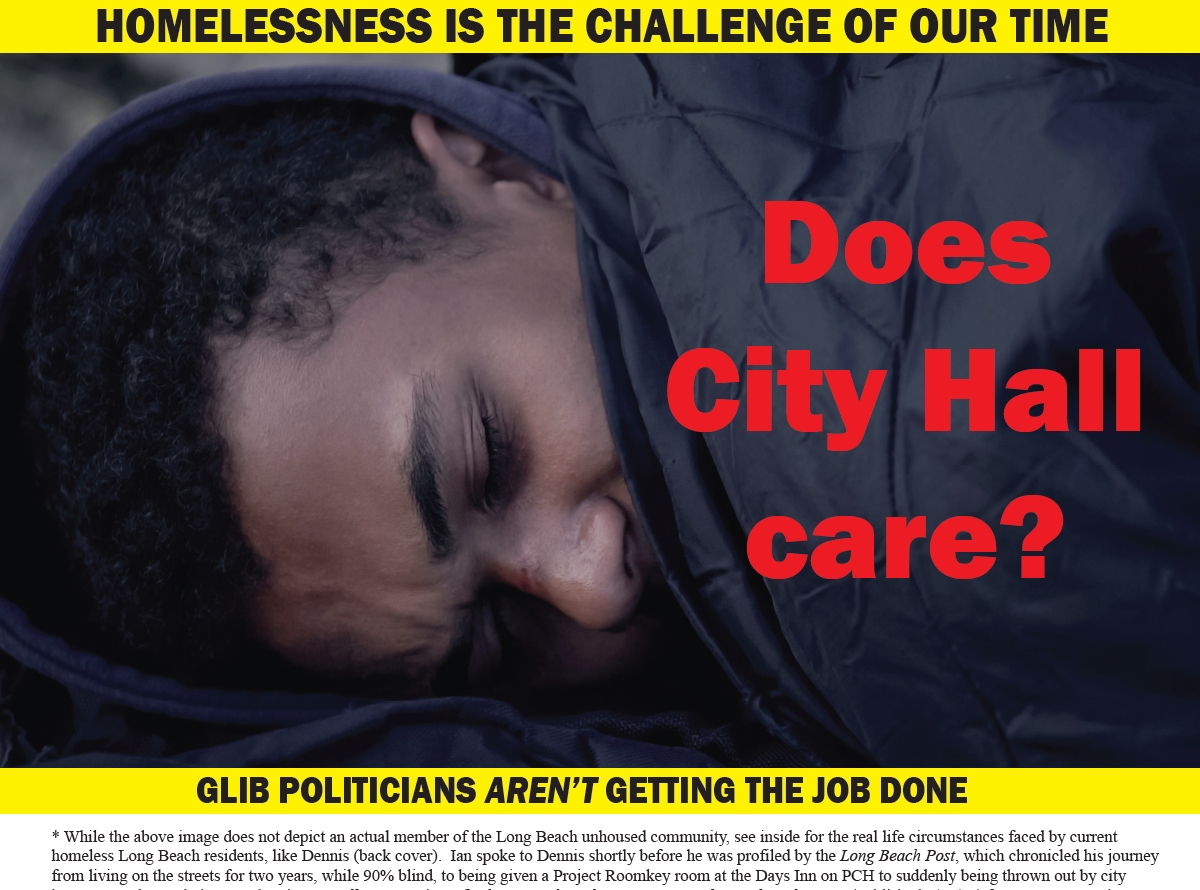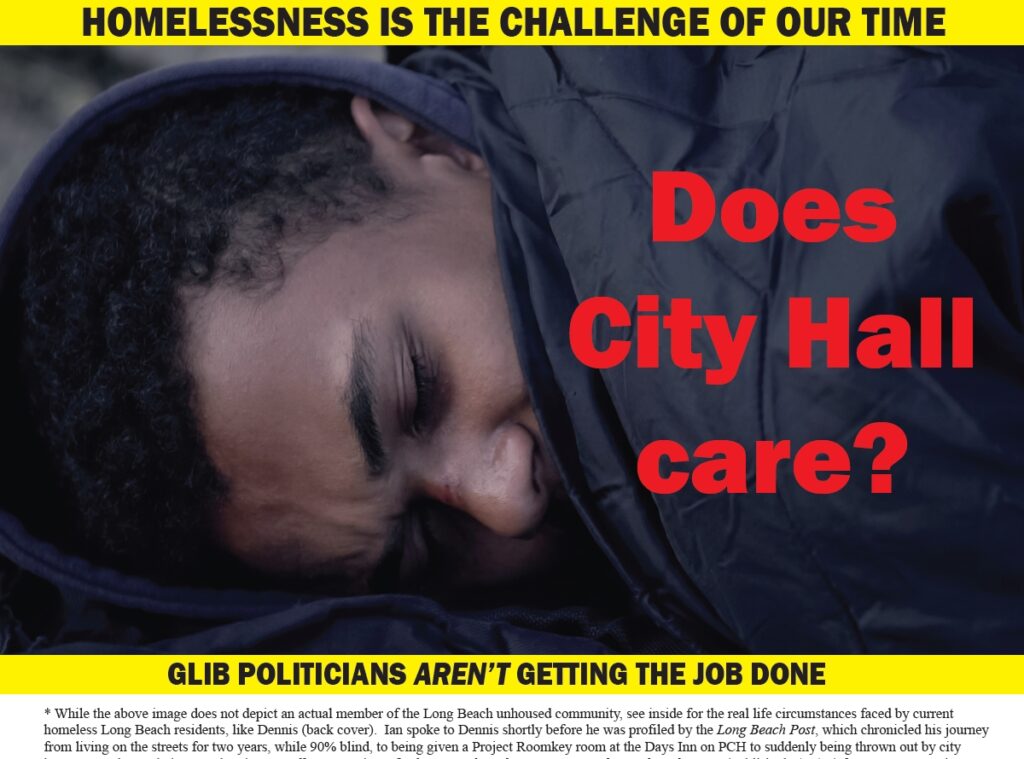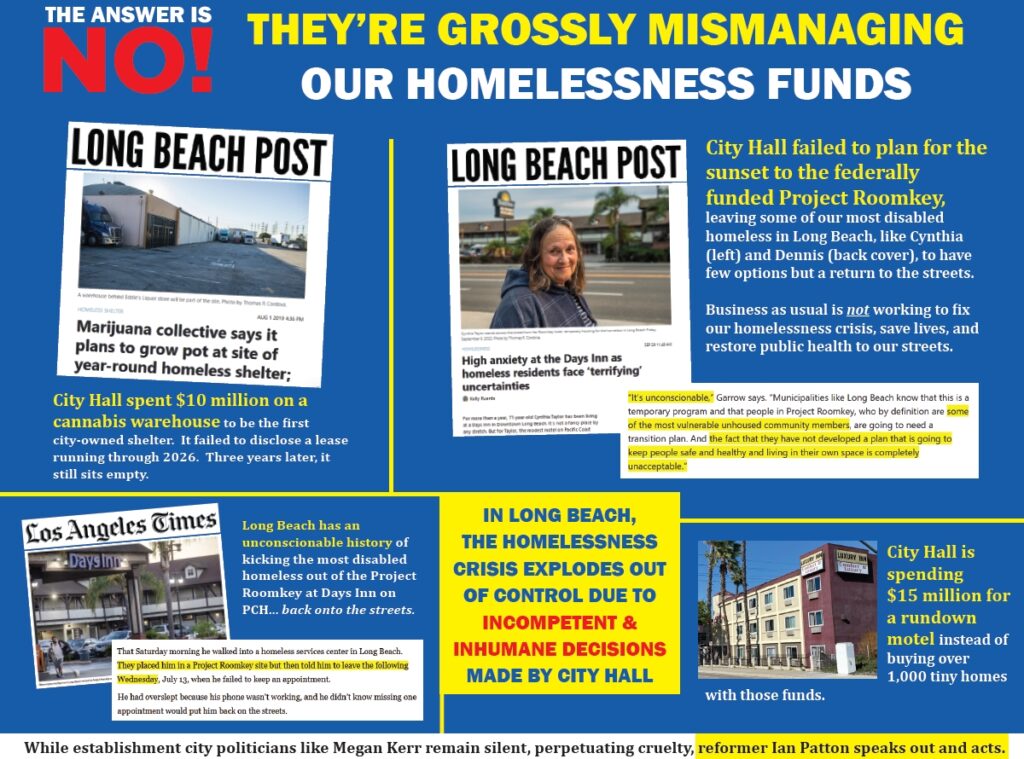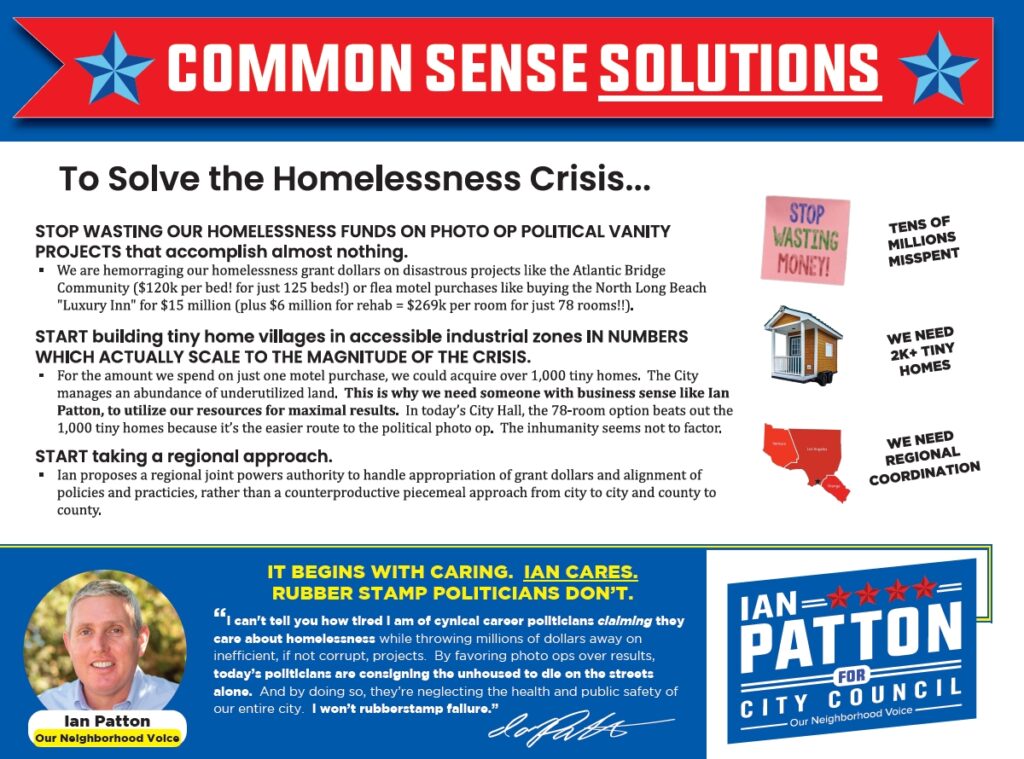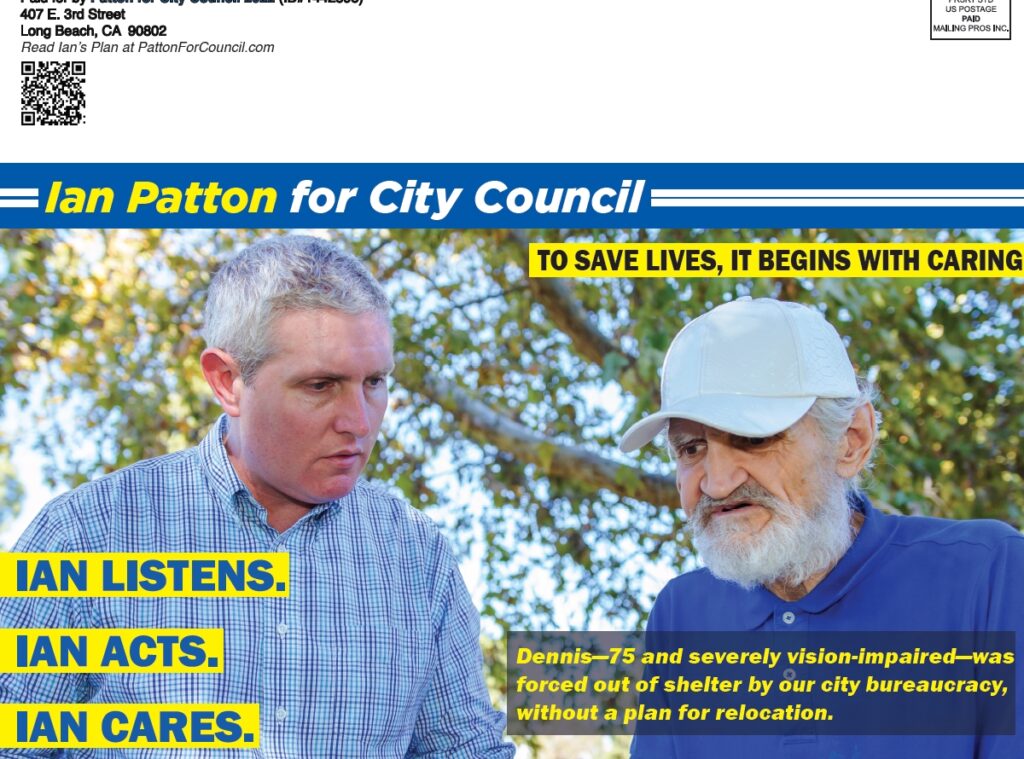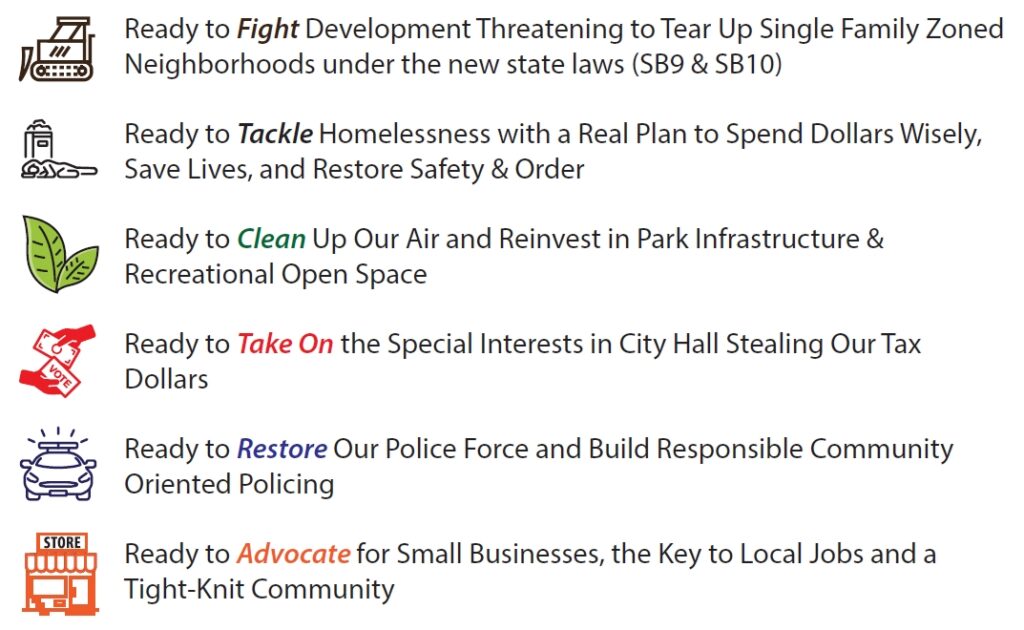
View Ian’s short Issues Videos, as well as Interviews, on the Video Page.
View Ian’s take on the City ballot measures here.
IAN IS RUNNING TO:

Get the job done on homelessness (with the regional planning and experts we’ve been ignoring rather than wasting money on a photo op phony N. Long Beach “shelter” boondoggle / cannabis cultivation warehouse) ☑️
Restore residents and small businesses as PRIORITY ONE at City Hall — that means putting Measure A back on the ballot, streamlining red tape and inspections, and treating small business owners like the crucial generators of local jobs that they are ☑️
Restore our focus on air quality, parks and open space, and revitalizing the LA River ☑️
Overhaul our budget, bring in outside experts to cut the WASTE, FRAUD, & ABUSE (also known as the bureaucratic and political payback BLOAT) ☑️
Save our neighborhoods from the coming threat of developers exploitation under the new state laws banning single family zoning protection, SB9 & SB10 ☑️
Restore public safety by restoring our 1,000+ sworn officers police force (currently close to just 800 officers) moving toward a true Community Oriented Policing model (with true oversight) where we have the resources and training for officers to become part of the community, rather than just sirens blaring through it ☑️
Restoring & Improving Our Police
- We need to peg our per capital police deployed force level to the LAPD per capita level as an absolute minimum (we are currently far below it).
- We need to better train and use higher standards for hiring. It’s wrong that officers receive less training than is required for other less critical fields such as cosmetology.
- We need to get back on track toward a force large enough and with enough training to adopt the Community-Oriented Policing model and exercise the Broken Windows Theory to policing.
- We need to to cut the abuse of overtime so that our officers are not so exhausted that they are unable to function at the highest level and we should return to a five-day work week for officers to create more regular schedules and shorter gaps in engagement in the field.
- We need to restore the Field Anti-Gang Unit.
- We need to return to robust traffic enforcement to curtain extreme, dangerous speeding and noise abuse.
- We need to empower a true citizens Police Commission, who can hire and fire an inspector general with full authority to review all departmental operations.
- We need to do a competitive analysis for all City contracts, including public safety personnel.
Environment
We need to combat the freeway “Diesel Death Zone”, by ending diesel goods movement emissions, revitalizing our river zones with trees and green space (as the nonprofit, Riverpark Coalition, on whose board Ian serves, strives to do) and by working toward complete electrification of goods movement at/from/to the Port of Long Beach. Recently Ian was one of the successful advocates pushing the Southern California Air Quality Management District to move toward regulating mobile sources of diesel pollution. Ian is strongly supported by the Sierra Club, and is an active member of TRAA, the organization working to ban the storage of highly dangerous, volatile tanks of hydrofluoric acid at nearby refineries.
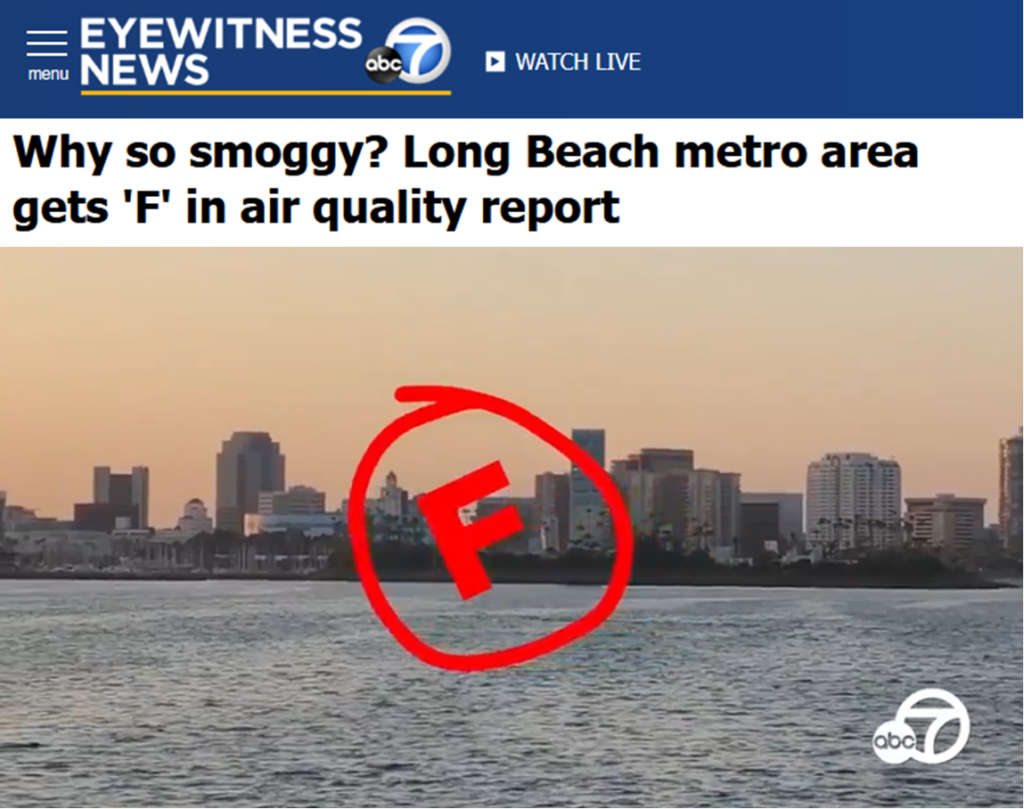
Homelessness
[click the image below to view the mailer]
IAN’S RESPONSES TO QUESTIONS FROM THE PRESS-TELEGRAM:
What are your top three priorities if elected?
Priority #1: I will fight attempts to exploit and despoil our relatively most affordable (for a coastal city), traditional housing base in Long Beach. That means pushing back against Sacramento’s attack on single family zoning (SB9 and SB10), which went into effect on January 1st with no protective action in place by our Council.
- We need a protective regulatory ordinance;
- We need to join the Redondo Beach/Torrance/Carson lawsuit challenging SB9 and defending local control for charter cities; and
- we need to support the Our Neighborhood Voices signature drive to amend the state constitution, led by Redondo Beach Mayor Bill Brand.
Regarding rental housing, we have to defend our traditional, flexible, relatively affordable mom & pop housing providers, pushing back against burdensome regulations intended to drive them out of the business, sell out, displace tenants from their older stock, low-rise complexes, and ultimately to bring in corporate developers who redevelop properties into soulless, corporate-managed luxury five-on-one boxes. Those new units may work near transit corridors in some places that, with city support, could theoretically bear the added density. But they shouldn’t come at the cost of displacing our working class housing providers and tenants, nor by means of dishonest ‘rent control’ type policies, where buildings become unmanageable and newer tenants pay more to subsidize older tenants paying less.
Priority #2: I will fight to restore public safety by restoring our police force and tackling the homelessness crisis with real solutions rather than photo optics. Our force has been constrained to the bursting point for over a decade. We see the consequences in a city with rising crime, both property crime and shootings. We see the consequences with a homelessness/drug addiction/mental health crisis metastasizing across the entire city. And we see the consequences with our own police force, which has a number of headline grabbing tragedies to reckon with, from officer involved shootings to officer suicides.
The ONLY way to get back on track is to restore our force to needed levels, to add more training and higher standards, to add accountability (which in the end serves the interests of most officers as well as the community, as bad apples cause a cascade of negative consequences) in the form of a real police commission, and to support our many good officers when they are in crisis or feel abused by the counterproductive politics of ‘defund the police’.
At a minimum, in order even to glimpse at implementing the ‘broken windows’ philosophy and the community-oriented policing model (both of which can only happen when officers have time for more than just 911 calls, rather than working extreme overtime shifts to the point of exhaustion), we have to restore our force from over 800 to back over 1,000 officers. It is shameful we don’t even have the level of public safety we had in the 1990s in the year 2022. We have one last opportunity before crime spirals completely out of control. And the same goes for homelessness, which I will address below.
Priority #3: I will tackle the special interest money machine known as our City Hall. This has been the guiding principle of my organization, the Long Beach Reform Coalition, since its inception four years ago (in response to the mayor/council’s attempts to extend their own term limits through a deceptively worded ballot measure).
The most important thing we can do in that regard is to get a complete top to bottom outside assessment and comparative performance review from a top national municipal government consultant. We need objective expert analysis of every dollar we spend, every department, every position, and every special interest giveaway, in terms of contracts, approvals, and tax abatements. We are an inherently wealthy city, with extraordinary sources of revenue other cities don’t have, ranging from the port, airport, and convention center, to oil, legally maxed out sales tax, hotel tax, and a high property tax base.
Clearly, if any city SHOULD NOT be rated near the bottom of the 423 cities ranked by the State Auditor on the Local Government High Risk Dashboard, it’s Long Beach. And yet there we are, as the City constantly claims poverty in response to its inability to maintain our streets, public safety services, and infrastructure. The money is there, it’s just being diverted to special interests.
We do not need the highest sales tax, and we should do an immediate moratorium on, and eventually rid ourselves of, that Measure A special interest shell game.
We should swear off the illegal practice of spending taxpayer dollars on ballot measure mailers (to get things like Measure A passed) engaging in veiled political advocacy.
We should empower grassroots candidates against the power of special interest campaign cash with a 6-to-1 campaign finance match.
We should reform officeholder accounts to their original purpose, not as campaign slush funds.
We should restore the public’s ability to occasionally agendize council items, to speak for more than 90 seconds, and to access their councilmembers at frequent town hall meetings.
And we need elected officials to be required to publish reports on their specific donors relating to Council items before they vote on them.
What would you do with the Queen Mary? Would you spend millions of dollars to make repairs and fix the ship? What is your plan?
There is no greater icon for the City of Long Beach and no more iconic symbol of the folly of Long Beach leadership over the decades, most particularly over the last eight years. The Mayor and Council, despite being warned that Urban Commons had no background in maritime preservation nor shoreside development, and that the commissioned marine study catalogued at the time nearly $300 million dollars in urgent deferred maintenance—NOT factored into the Urban Commons plan—moved forward, with wilful blindness, anyway. The head of the Economic Development Dept. failed to properly oversee Urban Commons’s lack of progress and the City fired the whistleblower marine inspector, Ed Pribonic, to shut him up, after he’d been inspecting the ship for well over two decades.
The only potential solution now—save for the long shot bid for the federal government to step in and declare it a national historic monument, taking on the financial burden—would be actually to come clean with the electorate. Rather than the mind-boggling dishonesty of declaring it a privilege to once again “regain control” our own ship (which happened by default as a result of the disastrous bankruptcy of our chosen lessee), we need to apologize to the people of Long Beach and lay out honest options. Those options range from $100 million to scrap the ship to $500 million for full repair and historic preservation, according to the most recent analysis.
Given that neither the City nor the Port has that kind of money lying around, the choice would have to be put to the voters as a bond measure, probably in the form of a parcel tax. The City has resisted this kind of politically difficult approach for decades. The threshold for passage of such a special tax would be 2/3rds. Should the vote fail, and I’d understand if it did, there would be few options to pay for scrapping the ship. This choice needs to be the voters’ decision, and it can only be made with at long last HONESTY on the party of City Hall.
What are your plans to increase affordable housing units? Do you support rent control?
As a third generation provider of affordable rental housing property, I understand how detrimental and disingenuous rent control policies are. To expand upon what I already said in response to the first question, rent control is a form of ham-handed economic re-engineering that ends up simply perverting the natural supply and demand equilibrium in unexpected ways. There are famously rent controlled units in Santa Monica, for example, that lessees have held onto long after they have grown older and moved up the economic ladder and bought a house, maintaining them as incredibly below-market weekend additional beach getaways.
More often rent control simply leads to management chaos, as abusive tenants (unless caught red-handed committing a violent crime) are virtually unevictable, and the slow destruction of morale for both the mom & pop landlord (carrying a mortgage and making a very narrow profit, at best) and the large majority of good decent tenants. Eventually the beaten down small landlord gives up, sells out, and the older stock housing gets replaced with gentrification. That means displacement for working class folks, both landlord and tenant alike. It’s also why for decades, economists have almost uniformly opposed rent control. To preserve our relatively affordable rental housing, any moves toward ever more oppressive anti-housing provider regulations must be strenuously opposed.
With regard to single family-zoned housing, we absolutely must resist SB9 and SB10, as I outlined in response to a previous question. While homeownership has become quite a bit more expensive compared to the trough of the last recession, it is still yet to return to previous peaks in terms of unaffordability. That is due to low interest rates, primarily, which are now creeping up. But the inflation-adjusted monthly payment, compared against median income (which has doubled in the last few decades), hasn’t set a record compared to previous peaks (on a national basis) and is certainly more affordable in Long Beach than many other desirable locales regionally.
In other words, there is no justification for destroying the largest asset most resident owners in Long Beach have. No developer should have the right to destroy a single family zoned block, as happened a generation ago in Long Beach with the “crackerboxes” (in and around greater Alamitos Beach), by coming in, buying out your neighbors, and shoving in an apartment complex up to the property line. There would be no accounting for parking and infrastructure, added public safety, nor open space. There is only developer exploitation when that happens, leaving the equity reservoir of a family’s lifesavings, their home, sitting in an extremely undesirable (some might say freakish) physical canyon, with two hours of daylight and no privacy. These kinds of practices are a true act of violence against innocent Long Beach homeowners and cannot be allowed to return to our city.
What would you do to reduce homelessness in the city?
We can all probably agree that homelessness has become a public health and safety crisis, for both the housed and unhoused in our city, on the verge of spiraling out of control. The question is what approach to take, the dishonest photo op-centric approach of City Hall which wastes millions with abysmal results or instead a rationalized public policy approach involving experts not bound by the exigencies of City Hall politics. The City Hall solution is to spend millions on a city-owned shelter which is poorly located and nearly unusable. The City Hall solution is providing little funding to and oversight over our poorly located homelessness services Multi-Service Center (MSC), rendering it nearly useless. The City Hall approach is to pretend like the federal 9th Circuit Court ‘Boise decision’ forecloses the possibility of enforcement after other forms of social worker intervention fail, when in fact the ‘Boise decision’ does no such thing.
My approach would be to listen to experts in homelessness, many of whom I have already consulted, for years, who cite our failure to engage in regional coordination, to provide sufficient vouchers, to properly spend our grant dollars, to properly site our city facilities intended to provide temporary shelter, bridge housing, and services, to conduct our homeless count properly, to track our homeless population properly, and generally to take the crisis seriously (rather than as a political annoyance we shower with empty words and promises). Specifically I would work to sell off and relocate the poorly located MSC and new City shelter (nearly on the border with Compton and being used as a cannabis cultivation site, a joke that would be funny if it weren’t so tragic), make them accessible 24-7 (rather than the current less than ‘bankers hours’), increase services, and pair these improvements with actually enforcing our anti-camping ordinance.
My signature proposal is that we form a regional joint powers authority for multi-county planning for both capital investment and grant dollars dissemination and multi-agency coordination. The unhoused don’t see or care about city boundaries, so city-centric political “credit” oriented policies will never work. Just as air quality is a regional, multi-county matter handled by SCAQMD, we need multi-county coordination for the planning, siting, and distribution of homelessness services funds and for all cities and counties in the region to move toward a uniform anti-camping enforcement system. There is nothing humane whatsoever about turning away and simply allowing a mentally ill and/or drug addicted fellow human being to “choose” to die on the streets.
What would you do to increase transparency in the Long Beach Police Department?
We are at a crucial juncture for the future of our police department. For the last thirty years we had a Citizens Police Oversight Commission which has had little to no real power and exercised even less power than it was given. The reform consulting firm brought in following the the George Floyd protests and the city’s ‘reconciliation’ process has been extremely unimpressive. It has laid out some complex options which still leave the crucial decision for the City Council to decide with little guidance: Will the citizens commission be empowered (as is the case in Los Angeles) and fully independent, or will it continue as a puppet of City Hall, controlled by the City Manager. The only solution is the former.
The idea of the additional role of an “inspector general” is a good one, so long as it is the citizens commission hiring, firing, and managing the new IG, and so long as the new IG has full access to the information necessary to do his or her job. Transparency should be the hallmark and reflexive response of our public servant peace officers, not obfuscation and seeking control over city politics through police union campaign cash. In the long run, that will not only make LBPD far better for serving residents, it will make it a far more rewarding place to work for officers.
Long Beach residents generally like and appreciate their police, and will certainly be understanding when difficult life or death, spur of the moment, decisions are made, so long as all information is available and a rationale for police actions is forthcoming. Full transparency is also the best way, politically speaking, to get ahead of those who overreact to sensational incidents, usually in the national press, and call for ‘defunding the police’. They often don’t understand that we have already de-staffed LBPD, and that has made things worse not better.
What is your plan to improve the economy as the city recovers from the pandemic?
We absolutely need an emergency moratorium on the Measure A extreme sales tax, beyond any conceivable justification amid hyperinflation. It has been an economic burden on the city for many years, with a lot people choosing to shop in Orange County for large purchases like TVs. Now it is literally killing businesses, like Liberation Brewing, a very-well liked (5th District) Atlantic Ave. establishment that recently became yet another casualty of the pandemic.
When small business retailers, bars, and restaurants have just barely survived the Long Beach anti-business obstacle course—of zero transparency on pandemic closure/reopening thresholds, which eliminated any forward planning (even by so much as a week in advance) during the height of the pandemic, combined with extremely burdensome inspection delays and regulations, extremely high fees, and the highest possible sales tax—we owe them at least a temporary break on sales tax until they get back on their feet. Ultimately, we need to put Measure A back on the ballot, so the voters can rid themselves of it. We need to end the trend toward demagogic policy-making that attacks all levels of business for the sake of particular special interest employee groups, often leaving the majority of workers behind even with regard to the particular policy in question (such as “hero pay” or targeted minimum wages, just for some workers). And we need to role out the red carpet, with staff devoted to helping start up entrepreneurs. The stories you hear of how difficult it has been to start a business in Long Beach are heartbreaking and need to be heard and taken seriously.
Give us one campaign promise of yours that your opponents wouldn’t make.
I promise to do everything in my power to put Measure A back on the ballot, for the sake of Long Beach small business and consumers.
Furthermore, I have signed the Long Beach Reform Pledge because I will work night and day to put residents interests above those of special interests.
And I will fight to get an outside audit of our city budget, given that our City Auditor is ethically compromised and has spent sixteen years doing virtually nothing but let massive boondoggles pass through City Council. All through the Civic Center billion-dollar catastrophe, Measure A, the Queen Mary, the Community Hospital ER deal disaster—and the list goes on—she has not held a single press conference.
I would fight development along the LA River which invalidates the plan for a greenbelt of new park space along the banks, promised in the LA River Master Plan and our own Long Beach RiverLink plan. I would vigorously defend our airport Noise Ordinance. There are so many things that differentiate me as the reform candidate in this race, it’s hard just to choose one.
